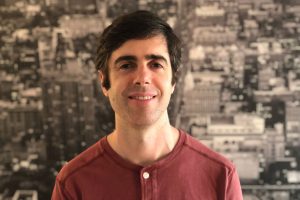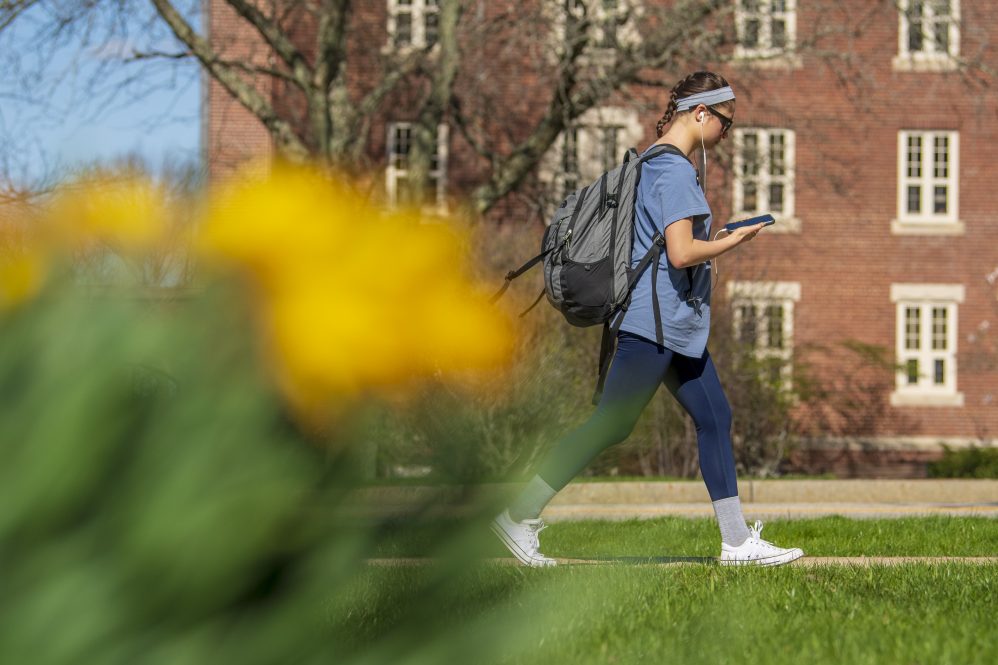What if high school students could harness the data they collect on their smart phones and watches to assess their physical and cognitive health and, while making those assessments, discover what it’s like to be a data scientist?
That’s the idea behind Brain Healthy, an initiative developed by a multi-disciplinary team of researchers and educators headed by Neag School of Education Assistant Professor Ido Davidesco with the support of a $1.3 million Science Education Partnership Award (SEPA) from the National Institute of General Medical Sciences (NIGMS) at the National Institutes of Health (NIH).
Brain Healthy was created in response to the dual challenges of preparing traditionally underrepresented students for data and health science careers and addressing the alarming increase in reported mental health issues among children, adolescents, and their families during the COVID-19 pandemic. The program builds on BrainWaves, a prior NIH SEPA-funded program led by Davidesco successfully implemented in 25 New York City public schools.
“We want our students to make use of data and interpret the data they see in the news and elsewhere,” says Davidesco, who is the primary investigator on the project. “We will do that by engaging them in collecting and analyzing data to determine how it can be used to impact their health. We hope to equip students with better tools to make assessments about their health.”

Davidesco and fellow Brain Healthy researchers – Wendy Suzuki, professor of Neural Science at NYU, and UConn professors Sandra Chafouleas and Eric Loken – will partner with public school teachers in Connecticut and New York City to engage ninth and tenth grade students in a “citizen science” research project evaluating their brain health and wellness. Using data from surveys and wearable devices, students will be taught how to analyze research-generated data and apply it to draw conclusions about, for example, the connection between the amount of sleep they get and their ability to focus during the day.
The month-long unit will be integrated into the required health education curriculum at schools that primarily serve students from underrepresented racial and ethnic groups in science, technology, engineering, and mathematics (STEM).
The Brain Healthy unit will begin with students participating in a comprehensive survey about their health and lifestyle practices developed with their input. They will then measure their heart rates with fitness trackers and complete a computerized cognitive task and mood survey tied to research about brain plasticity and how life experiences, such as physical exercise and stress, impact the brain.
Near-peer mentors – UConn and NYU undergraduate students from similar backgrounds as the high school students – will work with students to design data-driven investigations using de-identified data collected across all participating schools. The unit will culminate with a school-wide health science fair where students share their findings with the wider school community and beyond via social media.
“We’re promoting and presenting skills students can use to maintain a healthy brain,” says Chafouleas, a Board of Trustees Distinguished Professor in the Department of Educational Psychology at the Neag School.
The disruptive effects of the COVID-19 pandemic and the daily drumbeat of negative news about climate, politics, gun violence, and more have pushed reports of depression and anxiety among young people to the boiling point, Chafouleas says. In late 2021, the crisis prompted the American Academy of Child and Adolescent Psychiatry, the American Academy of Pediatrics, and the Children’s Hospital Association to jointly declare a national state of emergency in children’s mental health.
“Ido has put together a dream team of experts from different spaces to be part of a solution to a very big problem,” says Chafouleas.
Davidesco’s innovative research earned him a National Science Foundation Early Career Development (CAREER) Program Award in 2022. He describes his work as “positioned at the intersection of cognitive neuroscience and science education.” Using recent developments in portable and wearable technologies, he explores student attention and engagement in science learning and how portable and wearable technologies can be used to engage high school and university students in scientific investigations that are both authentic and meaningful to them.
Suzuki studies the effects of exercise on brain and cognitive function. She is a recognized thought leader in the area of brain health and wellness and the best-selling author of two books on the subject, “Healthy Brain Happy Life” and “Good Anxiety: Harnessing The Power Of The Most Misunderstood Emotion.”
Chafouleas, the founder and co-director of the UConn Collaboratory on School and Child Health, is an expert in the areas of integrated healthy and whole child learning, school mental health, and behavior.
Loken, an Associate Professor in the Research Methods, Measurement and Evaluation program in Neag’s Department of Educational Psychology, is interested in educational measurement and health. He has also been an influential voice in the open science and replicability movement, a scholarly movement dedicated to making research transparent, credible, reproducible, and accessible.
Brain Healthy will begin in 2023 with professional development courses for participating teachers and near-peer mentors prior to implementation in schools. Three cohorts of 10 teachers will be recruited for the program, each participating for three years. Approximately 1,500 students are expected to participate in program over the course of the five years.



